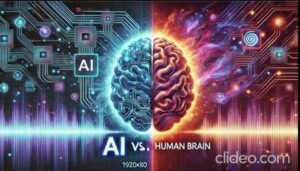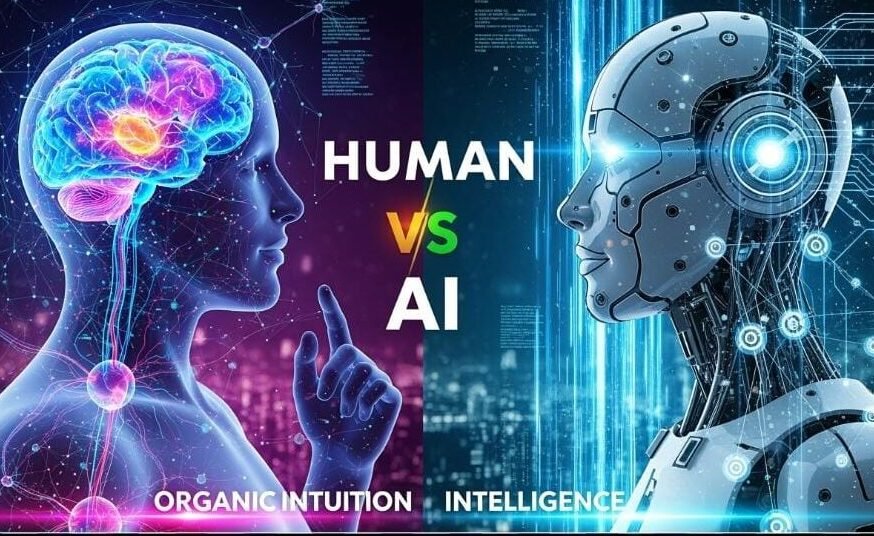AI VERSUS HUMAN UNTELLIGENCE
AI Versus Human Intelligence:The rapid rise of Artificial Intelligence (AI) has brought both excitement and concern across the globe. Machines that can think, learn, and act have changed industries ranging from healthcare to finance, while raising questions about whether they can match or even surpass human intelligence. To understand this debate clearly, it is essential to highlight the key details that define the similarities, differences, strengths, and limitations of AI and human intelligence.
What is Human Intelligence?
Human intelligence is the product of millions of years of evolution.It is not just about solving problems—it also involves creativity, emotional awareness, adaptability, and moral reasoning. Humans learn from experience, can generalize knowledge to new situations, and make decisions even with limited data.
Key aspects of human intelligence include:
Creativity and Imagination – the ability to invent, dream, and create art or technology.
Emotional Intelligence – the capacity to understand, manage, and respond to emotions in ourselves and others.
Adaptability – learning quickly in new situations and applying logic beyond available data.
Ethical Reasoning – making moral decisions based on fairness, empathy, and social values.
These traits give humans a unique edge that machines cannot replicate.
What is Artificial Intelligence?
Artificial Intelligence refers to computer systems designed to perform tasks that normally require human intelligence. By processing data and identifying patterns, AI systems can recognize speech, translate languages, detect diseases, and even drive cars.AI VERSUS HUMAN UNTELLIGENCE
Machine Learning (ML) and Deep Learning are the driving forces of AI, enabling systems to learn from data and improve performance over time. However, AI is typically narrow—it specializes in one task. For example, an AI may excel at diagnosing diseases from X-rays but cannot cook a meal or hold a conversation outside its training.
Strengths of AI
AI demonstrates impressive advantages in certain areas:AI VERSUS HUMAN UNTELLIGENCE
Speed and Efficiency – AI can analyze massive datasets in seconds, far beyond human capacity.
Accuracy – Reduces human error in areas like medical imaging, fraud detection, and navigation.
Automation – Handles repetitive and time-consuming tasks tirelessly.
24/7 Availability – Machines do not need sleep, food, or breaks.
Consistency – Unlike humans, AI performance does not vary due to mood, fatigue, or stress.
These features make AI an invaluable tool in industries that demand precision and large-scale data analysis.
Strengths of Human Intelligence
Humans, despite slower processing power, have strengths that AI cannot match:
Creativity – Humans innovate, imagine, and solve problems in novel ways.AI VERSUS HUMAN UNTELLIGENCE
Emotional Understanding – Empathy and compassion are deeply human qualities absent in AI.
Moral Judgment – Humans consider fairness, justice, and social norms in decision-making.

Adaptability – People can thrive in new, uncertain environments with little prior knowledge.
Contextual Thinking – Humans use intuition, cultural understanding, and common sense beyond raw data.
Limitations of AI
While AI is powerful, it also has clear limitations:
No Common Sense – Machines struggle with abstract reasoning or everyday logic.
Data Dependency – AI requires large, high-quality datasets to function effectively.
Bias Risks – Biases can be inherited and amplified by AI based on training data.
No Emotions or Ethics – Machines cannot truly empathize or make moral decisions.
Limited Creativity – AI is able to make patterns, but it lacks originality.
Limitations of Human Intelligence
Human intelligence, too, has boundaries:
Slower Processing – Humans cannot analyze huge datasets as quickly as machines.
Cognitive Biases – Decisions are often influenced by emotions, prejudice, or fatigue.
Memory Constraints – Human memory can be unreliable or fade over time.AI VERSUS HUMAN UNTELLIGENCE
Physical Needs – Humans require rest, food, and health maintenance.
AI vs. Human Intelligence: Key Comparison
Learning: AI learns from massive datasets; humans learn from experience and intuition.
Decision-Making: AI is logical and data-driven; humans combine logic with ethics and emotions.
Creativity: AI imitates existing patterns; humans innovate with originality.
Adaptability: AI struggles outside trained tasks; humans adapt quickly to new contexts.
Efficiency: AI works tirelessly; humans need rest but bring deeper insight.
Future Outlook
Collaboration is more important than AI replacing humans in the future. AI and human intelligence can accomplish more when combined than when used separately. AI will continue handling repetitive, data-heavy tasks, while humans focus on leadership, creativity, and ethics.AI VERSUS HUMAN UNTELLIGENCE
For example:
In healthcare, AI assists with diagnosis, while doctors provide compassionate care.
In education, AI personalizes lessons, while teachers inspire and mentor students.
In business, AI predicts market trends, while leaders make visionary decisions.AI VERSUS HUMAN UNTELLIGENCE
Conclusion
Artificial Intelligence and human intelligence are not rivals but complementary forces. AI brings unmatched efficiency and precision, while humans contribute creativity, empathy, and ethical reasoning. Understanding the key details of both reveals that the real strength lies in their collaboration. By combining machine speed with human wisdom, society can unlock a future of innovation, fairness, and progress.
